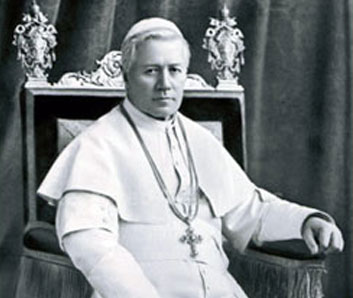 Giuseppe Sarto, AKA Joe Taylor, or St. Pius X . Photo credit: papalartifacts.com
Giuseppe Sarto, AKA Joe Taylor, or St. Pius X . Photo credit: papalartifacts.com Our other saint had done the same in the sixth century. Gregory I was born around 540, during the decline of the Roman Empire. Son of a Roman senator and Prefect of Rome, he became Prefect of the Eternal City at only 30 years old. Upon his father’s death, Gregory turned the family villa into a monastic community, and to this day San Gregorio monastery sits on that spot of the Caelian Hill. (Interestingly, somehow Mother Teresa managed to situate her European Motherhouse on the spot as well. Ten years ago I did a funeral Mass for a homeless man in San Gregorio church while the sisters and the poor of Rome sang laments, mostly off key.) Gregory was persuaded to become bishop of Rome in 590, and like Pius X he shored up what was left of the temporal order by focusing on the eternal. He strengthened his people's faith in and devotion to the Holy Mass. “Gregorian Chant,” for example, was one of Gregory’s contributions to the Sacred Liturgy.
The Catholic Church has contributed much to the arts and sciences, from systems of integrated healthcare, to the rule of law, to the scientific method, to music, painting, and architecture. In America, along with Catholic hospitals, the Church is best known for its Catholic schools and universities. Few Catholics in San Francisco attend Mass anymore, but many are proud to say they received a “Catholic education.” What good is a Catholic education, however, if almost every Catholic school graduate abandons the Mass? We are educating our children for Harvard, perhaps, but not for Heaven. And if we are not educating them for Heaven, even their lives on earth will be disordered.
In my own experience at Star of the Sea, worship had become secondary to education. The parish was dying, but the school was thriving, brimming with energy and money. Energy and money for what, though? The school had lost its defining purpose, and anyone who pointed this out was demonized. Parents enrolling their children in the school were told, apparently, that they never had to attend the church, and that the parish and school had long ago gone in different directions. Thus, the one thing that distinguishes authentic Catholic education (faith in the Eucharist) was missing. 75% of Catholics in America today don’t believe in the Eucharist, and I would bet most of them attended Catholic schools.
If parishes cease being “schools of prayer” (in the words of Pope John Paul), they will die, and their schools will eventually die with them. If the Church is not focused on the one thing necessary, which is prayer and especially the Holy Mass, her parishes will decay. Her hospitals, her universities, her music and art, her schools will decay with them. Popes Gregory and Pius did not focus on Catholic education, or Catholic health care, or Catholic social programs. They focused on the Holy Mass, on the Sacred Eucharist. All the Church's good works will follow if we are faithful to the Mass. Without the Eucharist, however, we will have only corruption and decline.
Who will be our Gregory the Great, and who our Pius X? Who will restore the Holy Mass to its first place in Catholic parishes, schools, universities, and hospitals?


 RSS Feed
RSS Feed